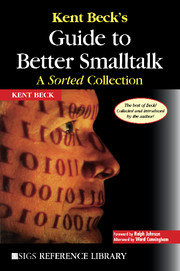Book contents
- Frontmatter
- Contents
- FOREWORD
- PREFACE
- INTRODUCTION
- 1 A DIAGRAM FOR OBJECT-ORIENTED PROGRAMS
- 2 CONSTRUCTING ABSTRACTIONS FOR OBJECT-ORIENTED APPLICATIONS
- 3 PLAYRGOUND: AN OBJECT ORIENTED SIMULATION SYSTEM WITH AGENT RULES FOR CHILDREN OF ALL AGES
- 4 A LABORATORY FOR TEACHING OBJECT-ORIENTED THINKING
- 5 THINK LIKE AN OBJECT
- 6 WHY STUDY SMALLTALK IDIOMS?
- 7 THE DREADED SUPER
- 8 ABSTRACT CONTROL IDIOMS
- 9 VALUEMODEL IDIOMS
- 10 COLLECTION IDIOMS
- 11 AN OBJECTWORKS\SMALLTALK 4.1 WRAPPER IDIOM
- 12 A SHORT INTRODUCTION TO PATTERN LANGUAGE
- 13 WHOLE LOTTA SMALLTALK: THE TECHNOLOGY
- 14 INSTANCE-SPECIFIC BEHAVIOR: HOW AND WHY
- 15 INSTANCE-SPECIFIC BEHAVIOR: DIGITALK IMPLEMENTATION AND THE DEEPER MEANING OF IT ALL
- 16 TO ACCESSOR OR NOT TO ACCESSOR
- 17 INHERITANCE: THE REST OF THE STORY
- 18 INHERITANCE: THE REST OF THE STORY (CONT.)
- 19 HELPER METHODS AVOID UNWANTED INHERITANCE
- 20 IT'S NOT JUST THE CASE
- 21 CRC: FINDING OBJECTS THE EASY WAY
- 22 DEATH TO CASE STATEMENTS
- 23 WHERE DO OBJECTS COME FROM?
- 24 PATTERNS AND SOFTWARE DEVELOPMENT
- 25 DISTRIBUTED SMALLTALK
- 26 WHERE DO OBJECTS COME FROM? FROM VARIABLES AND METHODS
- 27 BIRDS, BEES, AND BROWSERS—OBVIOUS SOURCES OF OBJECTS
- 28 USING PATTERNS: DESIGN
- 29 PATTERNS GENERATE ARCHITECTURES
- 30 SIMPLE SMALLTALK TESTING
- 31 ARCHITECTURAL PROTOTYPE: TELEVISION REMOTE CONTROL
- 32 DEMAND LOADING FOR VISUALWORKS
- 33 GARBAGE COLLECTION REVEALED
- 34 WHAT? WHAT HAPPENED TO GARBAGE COLLECTION?
- 35 SUPER + 1
- 36 CLEAN CODE: PIPE DREAM OR STATE OF MIND?
- 37 A MODEST META PROPOSAL
- 38 USES OF VARIABLES: TEMPS
- 39 VARIABLES OF THE WORLD
- 40 PATTERNS 101
- 41 FAREWELL AND A WOOD PILE
- AFTERWORD
- INDEX
18 - INHERITANCE: THE REST OF THE STORY (CONT.)
Smalltalk Report, September, 1993
Published online by Cambridge University Press: 04 August 2010
- Frontmatter
- Contents
- FOREWORD
- PREFACE
- INTRODUCTION
- 1 A DIAGRAM FOR OBJECT-ORIENTED PROGRAMS
- 2 CONSTRUCTING ABSTRACTIONS FOR OBJECT-ORIENTED APPLICATIONS
- 3 PLAYRGOUND: AN OBJECT ORIENTED SIMULATION SYSTEM WITH AGENT RULES FOR CHILDREN OF ALL AGES
- 4 A LABORATORY FOR TEACHING OBJECT-ORIENTED THINKING
- 5 THINK LIKE AN OBJECT
- 6 WHY STUDY SMALLTALK IDIOMS?
- 7 THE DREADED SUPER
- 8 ABSTRACT CONTROL IDIOMS
- 9 VALUEMODEL IDIOMS
- 10 COLLECTION IDIOMS
- 11 AN OBJECTWORKS\SMALLTALK 4.1 WRAPPER IDIOM
- 12 A SHORT INTRODUCTION TO PATTERN LANGUAGE
- 13 WHOLE LOTTA SMALLTALK: THE TECHNOLOGY
- 14 INSTANCE-SPECIFIC BEHAVIOR: HOW AND WHY
- 15 INSTANCE-SPECIFIC BEHAVIOR: DIGITALK IMPLEMENTATION AND THE DEEPER MEANING OF IT ALL
- 16 TO ACCESSOR OR NOT TO ACCESSOR
- 17 INHERITANCE: THE REST OF THE STORY
- 18 INHERITANCE: THE REST OF THE STORY (CONT.)
- 19 HELPER METHODS AVOID UNWANTED INHERITANCE
- 20 IT'S NOT JUST THE CASE
- 21 CRC: FINDING OBJECTS THE EASY WAY
- 22 DEATH TO CASE STATEMENTS
- 23 WHERE DO OBJECTS COME FROM?
- 24 PATTERNS AND SOFTWARE DEVELOPMENT
- 25 DISTRIBUTED SMALLTALK
- 26 WHERE DO OBJECTS COME FROM? FROM VARIABLES AND METHODS
- 27 BIRDS, BEES, AND BROWSERS—OBVIOUS SOURCES OF OBJECTS
- 28 USING PATTERNS: DESIGN
- 29 PATTERNS GENERATE ARCHITECTURES
- 30 SIMPLE SMALLTALK TESTING
- 31 ARCHITECTURAL PROTOTYPE: TELEVISION REMOTE CONTROL
- 32 DEMAND LOADING FOR VISUALWORKS
- 33 GARBAGE COLLECTION REVEALED
- 34 WHAT? WHAT HAPPENED TO GARBAGE COLLECTION?
- 35 SUPER + 1
- 36 CLEAN CODE: PIPE DREAM OR STATE OF MIND?
- 37 A MODEST META PROPOSAL
- 38 USES OF VARIABLES: TEMPS
- 39 VARIABLES OF THE WORLD
- 40 PATTERNS 101
- 41 FAREWELL AND A WOOD PILE
- AFTERWORD
- INDEX
Summary
I think this was originally titled “Inheritance: The Rest of the Rest of the Story,” but it got edited. Oh well.
The pattern presented here is another in the “Transformation Series.” It recommends letting inheritance evolve from the need to reduce code duplication.
In the June issue, where I took on accessor methods, I stated that there was no such thing as a truly private message. I got a message from Nikolas Boyd reminding me that he had written an earlier article describing exactly how to implement really truly private methods. One response I made was that until all the vendors ship systems that provide method privacy, Smalltalk cannot be said to have it. Another is that I'm not sure I'd use it even if I had it. It seems like some of my best “reuse moments” occur when I find a supposedly private method in a server that does exactly what I want. I don't yet have the wisdom to separate public from private with any certainty.
On a different note, I've been thinking about the importance of bad style. In this column, I always try to focus on good style, but in my programming there are at least two phases of project development where maintaining the best possible style is the farthest thing from my mind. When I am trying to get some code up and running I often deliberately ignore good style, figuring that as soon as I have everything running I can simply apply my patterns to the code to get well-structured code that does the same thing.
Information
- Type
- Chapter
- Information
- Kent Beck's Guide to Better SmalltalkA Sorted Collection, pp. 189 - 194Publisher: Cambridge University PressPrint publication year: 1997
